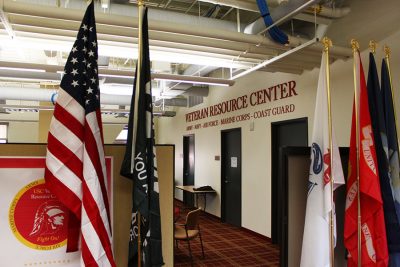Amid the changes necessary to adapt to a new normal of all-virtual or hybrid instruction given the ongoing COVID-19 pandemic, higher ed institutions are stepping up to meet the unique needs of student veterans.
Christopher Rhone, coordinator of veteran affairs at Howard University, says Howard is providing increased online assistance for veterans via platforms like Zoom and Facetime.
 (Photo by Jessica Zhou/The Daily Trojan)
(Photo by Jessica Zhou/The Daily Trojan)
The Veterans Resource Center (VRC) at the University of Southern California (USC) hosts virtual meet-ups for its veteran students twice a week, giving them the time and space to convene with one another amid remote learning, said Josue Rodriguez, a VRC student staff member.
“Normally, we’d be a center that in-person veterans can attend. We act like a study lounge and a place that has a list of resources and stuff like that,” Rodriguez said. “This semester, we’ve gone completely virtual. And to supplement that, we’re hosting two virtual lounges every week. We’re going to have them on Wednesdays and Thursdays.”
According to Rodriguez, due to a shorter semester, most of the programming will stop on Nov. 14.
USC’s VRC is also planning events, such as one to help veteran students with financial literacy, Rodriguez said.
USC’s annual Veterans and Military Families Recruiting Night is also still set to happen, yet much like other events this year, it will be virtual. The Oct. 29 event, which is free and also open to non-USC veterans, typically draws in about 50 employers and 300 attendees, said Shahla Fatemi, manager of military and veterans initiatives at USC. It will be co-hosted with the student-run USC Veterans Association.
“Usually, this is limited by how far you are from the event,” Fatemi said. “The nice thing about this year is we’re taking it virtually, so it’s going to be really available. If you have an internet connection, nationally or even internationally, you can attend, which is really cool because we have a number of veterans at other schools that want to be part of this.”
Another way in which higher ed institutions can help their student veterans is through financial assistance, which is what the University of Pittsburgh is doing.
“We think about who a veteran student is. They’re typically about 25 years old, probably married, have children. So they’re adults,” said Aryanna Berringer, director of the Office of Veteran Services at the University of Pittsburgh. “So, the pandemic hit them much like everyone else in America.
“So, to that end, my office put out a specific grant to our military students and our veteran student population [which] would support them with a $500 grant to help with any COVID-related issues or expenditures that they may be having because of whether it was job loss from a spouse or themselves or utility payments, whatever that need was.”
The $500 grant is accessible to both ROTC and veteran students, Berringer said.
Meanwhile, Howard University has given its ROTC department a larger housing stipend — due to COVID-19 — to help offset some costs for ROTC students living off campus, said Lt. Col. Creyonta West, professor of military science at Howard University. West oversees Howard’s Army ROTC program.
According to an article from Ithaka S+R, a New York-based research and consulting service, the pandemic — and the struggling economy it has created — has given rise to multiple complications that leave student veterans vulnerable. One issue is that the shift to virtual instruction jeopardized some financial support for veterans under the Post-9/11 G.I. Bill. Some of that support, like housing allowances and work-study payments, required veterans to be engaged through in-person instruction.
Congress passed legislation earlier this year that allows the Department of Veterans Affairs (VA) to adapt and continue to fund veterans’ education at in-person instruction levels through Dec. 21, 2020.
Other complications veterans may face are insufficient funding for community colleges — which many veterans attend — predatory marketing practices from for-profit institutions and having to drop out due to financial difficulties, according to Ithaka S+R.














